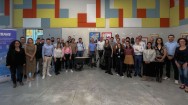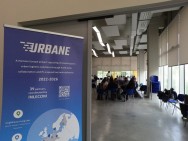- Home
- International relations and projects
- URBANE project, workshop on digital tools for innovation in last-mile logistics
URBANE project, workshop on digital tools for innovation in last-mile logistics
On 12-13 October, the Municipality of Bologna, in collaboration with Foundation ITL - Institute for Transport and Logistics (ITL), hosted a two-day meeting to align the URBANE project activities between the four pilot cities (Bologna, Thessaloniki, Helsinki and Valladolid) and the project partners offering technological solutions to support the experimental actions.
On this occasion, key partners came together to define the requirements for the development of digital models and services to be applied to the physical tests that will be conducted in cities with the aim of facilitating efficient, sustainable and innovative distribution of goods in the last urban mile.
Among the tools made available by the technology partners: the Digital Twin, a digital replica of the urban environment, which allows monitoring and simulation of various logistics scenarios, useful for testing innovative ideas and making data-driven decisions; the Impact Assessment Radar, which offers a comprehensive view of the environmental consequences linked to last-mile logistics, enabling cities to opt for more sustainable practices; the URBANE Models Library, a true simulation and planning tool capable of suggesting efficient transport decisions; and, finally, Blockchain and Smart Contracts, technologies that enable stakeholders to benefit from cost reductions, automation in contract administration and better tracking of data across networks and records with immutable timestamps to avoid rejection of transactions.
By using predictive analysis, these models cand do a better estimation of the demand for goods, especially concerning e-commerce and retail businesses. This ability to anticipate and manage demand effectively can lead to more sustainable and efficient urban logistics solutions, but not only: in addition to achieving increasingly higher levels of efficiency in the deliveries, cities will be able to enjoy gradually decreasing pollution levels.
Normativa di riferimento »
Ultimo aggiornamento: lunedì 13 novembre 2023








